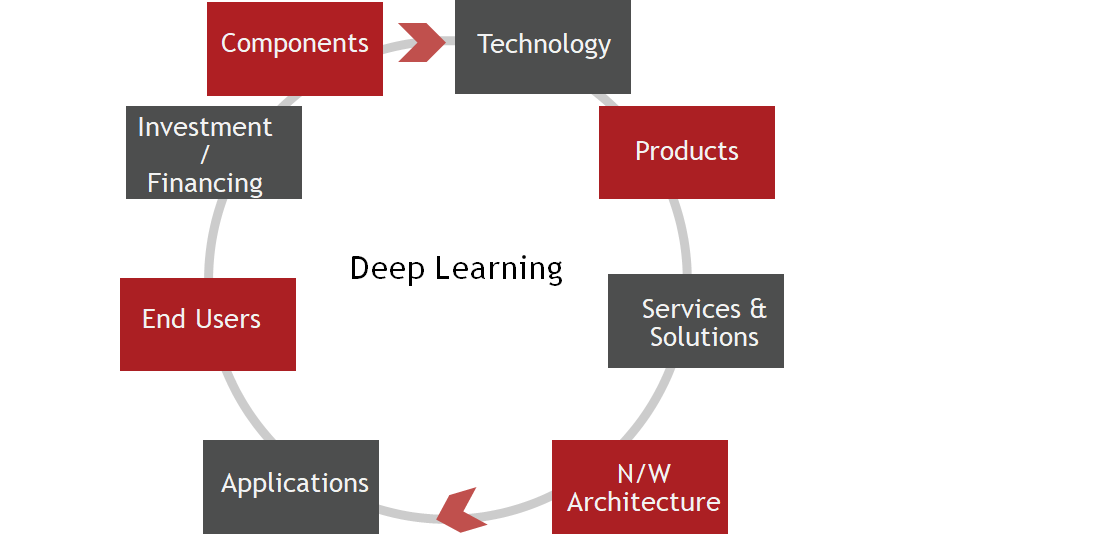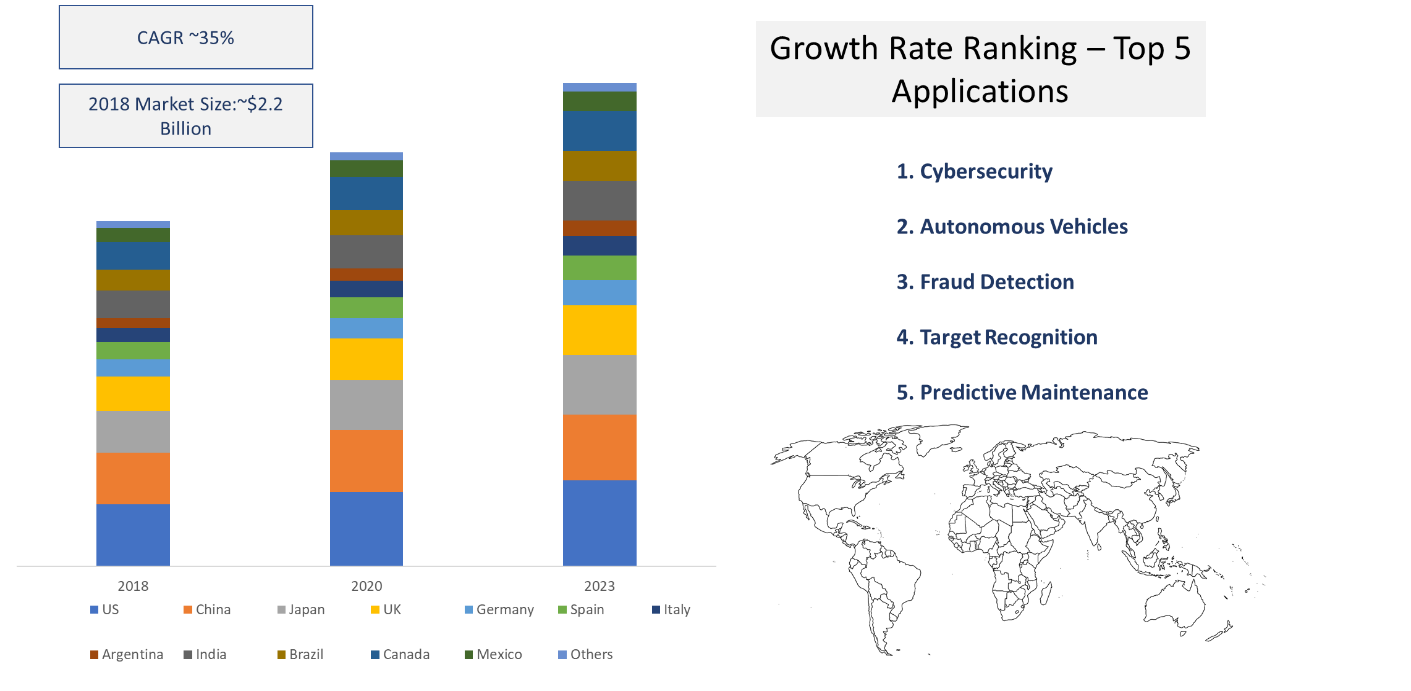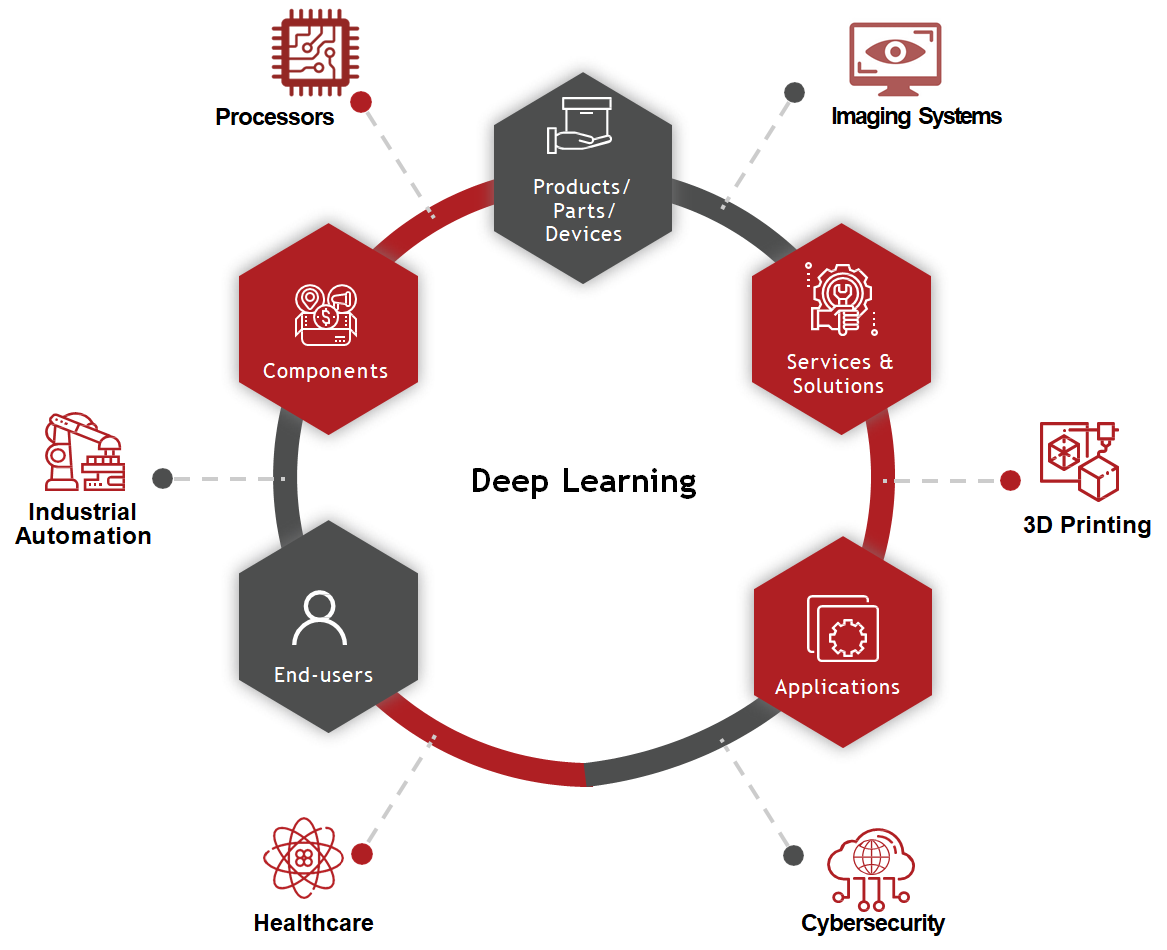Deep learning is an integral subset of machine learning that has networks capable of learning from unstructured data. Several companies across industries such as retail, healthcare, aerospace & defense, and BFSI, among others, are joining hands with software development companies to use deep learning technology, for saving cost and time and for improving overall efficiency. Healthcare companies such as Bayer A.G., Eli Lilly & Company, Amgen Corporation, and AstraZeneca Plc are strengthening their internal research team and collaborating with software development companies to improve the drug discovery process. The impact of deep learning ecosystem across industries such as retail, healthcare, automotive, telecom, and BFSI are expected to intensify in the next 5 years. The deep learning market ecosystem is poised to grow at an excess of 30% CAGR during the forecast period from 2019-2023.
In terms of investments in the field of artificial intelligence & deep learning market ecosystem, the U.S. has overtaken China to grab the topmost spot as a venture capital investment hub. The U.S. attracted the most investment in 2018, accounting for more than 50% of total investments in AI and Deep Learning ecosystem across the globe. The investment figure in the country is expected to grow significantly in the coming years. The growth in investments in the U.S. is fueled by companies such as Cruise Automation, Zymergen, Dataminr with the total investment reaching approximately US$ 14 Bn in 2019. On the other hand, China attracted investment worth US$ 7.4 Bn in the same year.

Despite complexities, major corporations are focusing on implementing deep learning technologies in their processes. Deep learning is used for a wide range of applications such as cybersecurity, predictive maintenance, autonomous vehicles, and threat monitoring, among others. Cyber-attacks have witnessed a steep increase over the past few years across industries. Supply chain attacks increased by approximately 78% in 2018 and data breaches have increased by up to 4 times since 2016. Such threats have led both the public and private sector to invest heavily in defense and cybersecurity. This has led to an exponential rise in demand for solutions specific to deep learning market ecosystem, which in turn, has created a positive impact on the entire ecosystem of artificial intelligence. Cybersecurity companies have witnessed sales growth by approximately 15% over the past 3 years, with annual spending amounting to more than US$ 120 Bn.
Autonomous vehicles are another area for the expansion of deep learning market from a technological point of view. Although a distant concept, developed countries such as the U.S., Germany, and France will witness the entry of autonomous vehicles in the next 5 to 6 years. To speed up the process, several automotive giants are investing heavily in research & development activities to bring out concepts of autonomous vehicles that could be made production-ready. For instance, the Peugeot E-Legend is an autonomous concept vehicle developed by Groupe PSA and is claimed to be 100% driverless. Further, the Renault-Nissan-Mitsubishi alliance is on the process of launching 40 vehicle models including autonomous drive vehicle technologies by 2022. For instance, in June 2019, Volvo Group and NVIDIA Corporation announced joining forces to develop driverless trucks, where Volvo Group would use NVIDIA's AI-enabled platforms for in-vehicle computing, training, and simulation purposes. Such alliances are expected to complement the growth of the deep learning ecosystem in the coming years.
| Components | Services & Solutions | Services & Solutions | Applications | End-users |
| Processors | Smartphone & Tablet | Solution | Predictive Maintenance/Self Diagnostics | Logistics |
| Memory | Wearable | Services | Fraud Reduction | Healthcare |
| Storage | Workstation System | Cybersecurity | Transportation | |
| FPGA | Medical Devices | Network Security | Automotive | |
| ASIC | Pharma/Biopharma | Network Optimization | Retail | |
| Modules | Smart Modules | Customer Analytics | BFSI | |
| Imaging Systems | Virtual Assistance | Telecom & Consumer Electronics | ||
| Smart Trackers | Network Operations & Monitoring Management | Oil & Gas | ||
| Smart Meters | Security & Surveillance | Others | ||
| Others | Recommendation Engine | |||
| Predictive Merchandising | ||||
| Inventory Management | ||||
| Others |
The fall in the value of cryptocurrencies acted as a boon for the GPU manufacturers, as prices of GPUs witnessed a sharp decline after the first quarter of 2018. GPU prices of NVIDIA Corporation and AMD Inc. witnessed a dramatic increase by up to 50% in the first quarter of 2018 due to a boom in cryptocurrencies. This put a lot of pressure on manufacturers and consumers alike, as both were struggling to contend with the high prices of GPUs. However, the value of cryptocurrencies witnessed a sharp decline from the second quarter of 2018, as nearly US$ 6 Bn was wiped out of the global market in a single day. This eased up the road for GPU manufacturers and they resumed their research & development activities to upgrade their hardware.
Industries such as BFSI, telecom, retail, and aerospace & defense are lucrative areas for the penetration of deep learning as these industries generate and store a vast amount of data daily, and a sophisticated cyberattack can have a disastrous effect on these industries. For instance, the WannaCry ransomware attack in 2017 was a major cyberattack that targeted computers running on Windows operating systems by encrypting data and demanding ransom payments in the form of cryptocurrencies. More than 200,000 companies were affected spanning across 150 countries. Russia, India, Taiwan, and Ukraine were highly affected by the attack. To prevent future attacks, major corporations have ramped up their R&D expenses to focus more on AI and deep learning technologies to improve cybersecurity.

There are many trends that are having an impact on the Deep Learning market forecast. These, when evaluated from a company’s perspective, can drive growth. Our numerous consulting projects have generated sizeable synergies across all regions and all sizes of companies.
| Company | Ecosystem Positioning | Total Revenue | Industry | Region |
| IBM Corporation | Solution & Service Provider | $ 79 Billion | Automotive, Aerospace & Defense, BFSI, Public & Social Sector, Healthcare, Retail, etc. | Global |
| Amazon.com Inc. | Solution & Service Provider | $72.4 Billion | Retail | Global |
| Google Inc. | Solution & Service Provider | $136.22 Billion | BFSI, Retail, etc. | Global |
| Intel Corporation | Hardware Manufacturers and Service Provider | $37 Billion | Automotive, Telecom, BFSI, Healthcare, Aerospace & Defense, etc. | Global |
| NVIDIA Corporation | Hardware Manufacturers and Service Provider | $9.7 Billion | Healthcare, Retail, Automotive, Public & Social Sector, Telecom, etc. | Global |
Very few markets have interconnectivity with other markets like deep learning. Our Interconnectivity module focuses on the key nodes of heterogeneous markets in detail. AI processors, AI-enabled imaging systems, AI in healthcare, AI in cybersecurity, 3D printing markets are some of our key researched markets.

| Trends | Components | Products | Technology | End-users | Impact on Market |
| Deep learning allows for the development of sophisticated forecasting models that incorporate unstructured datasets in the retail sector | GPU | Retail | 2.72% | ||
| Using deep learning to detect faulty parts in an aircraft, thereby making it easier for aircraft engineers | Aerospace & Defense | 0.46% |

Ask for free product review call with the author

Share your specific research requirements for a customized report

Request for due diligence and consumer centric studies

Request for study updates, segment specific and country level reports
